Unit 7 Seasons知识要点课件36张
文档属性
| 名称 | Unit 7 Seasons知识要点课件36张 |
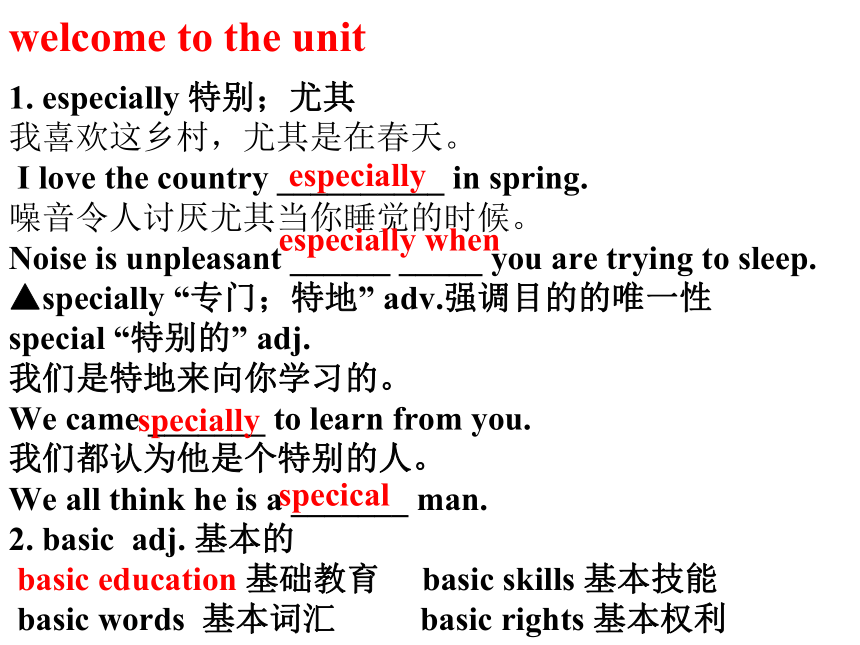
|
|
| 格式 | pptx | ||
| 文件大小 | 146.9KB | ||
| 资源类型 | 教案 | ||
| 版本资源 | 牛津译林版 | ||
| 科目 | 英语 | ||
| 更新时间 | 2022-04-10 16:05:42 | ||
图片预览

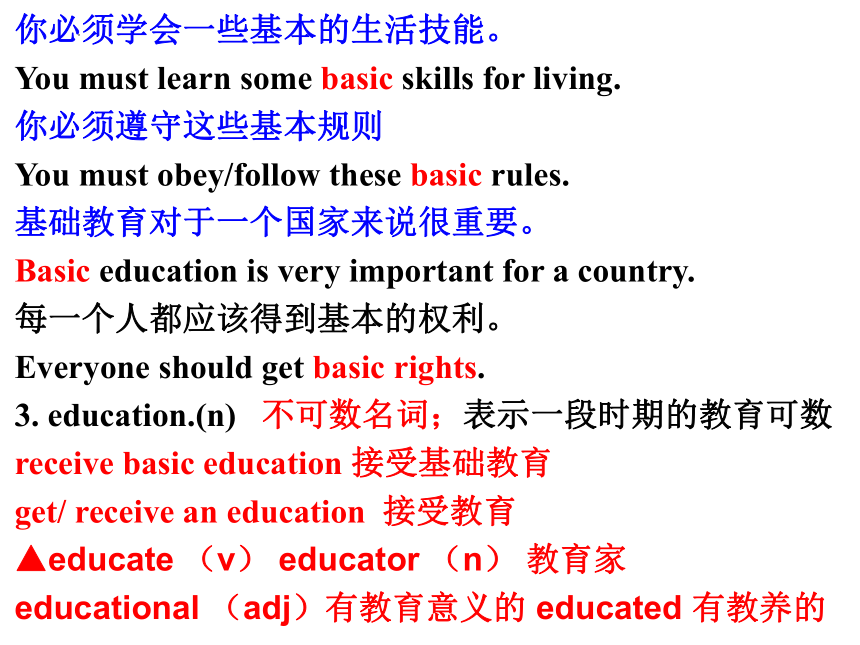
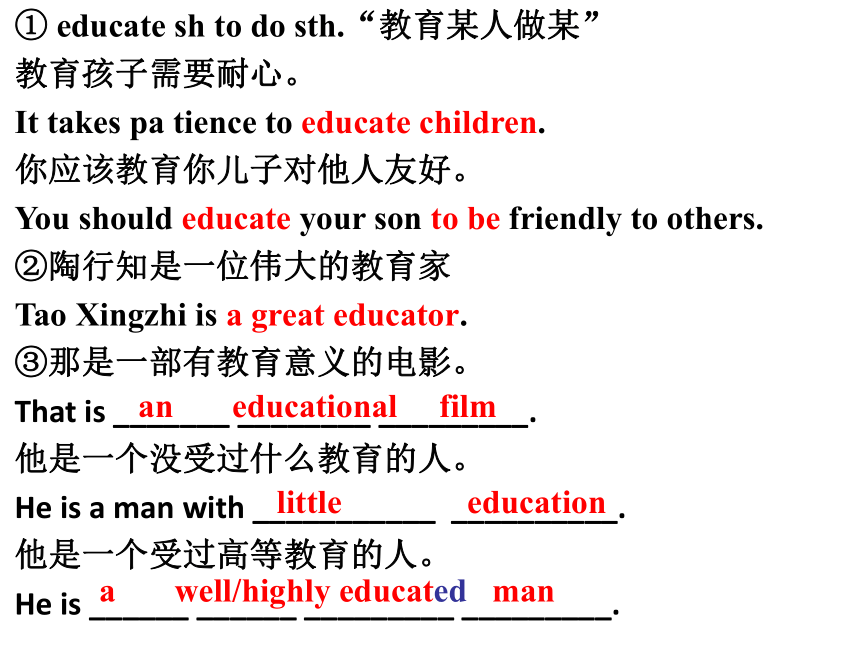
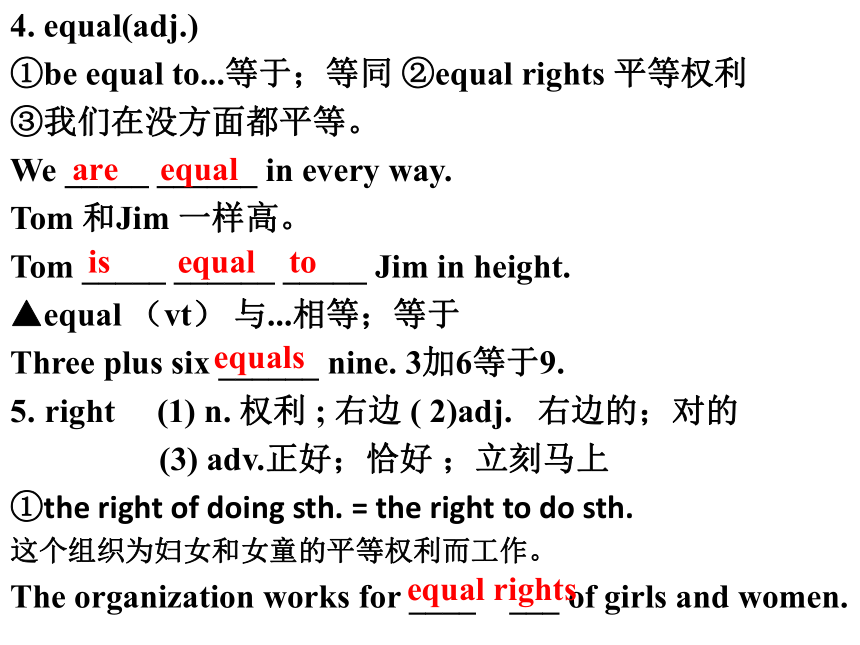
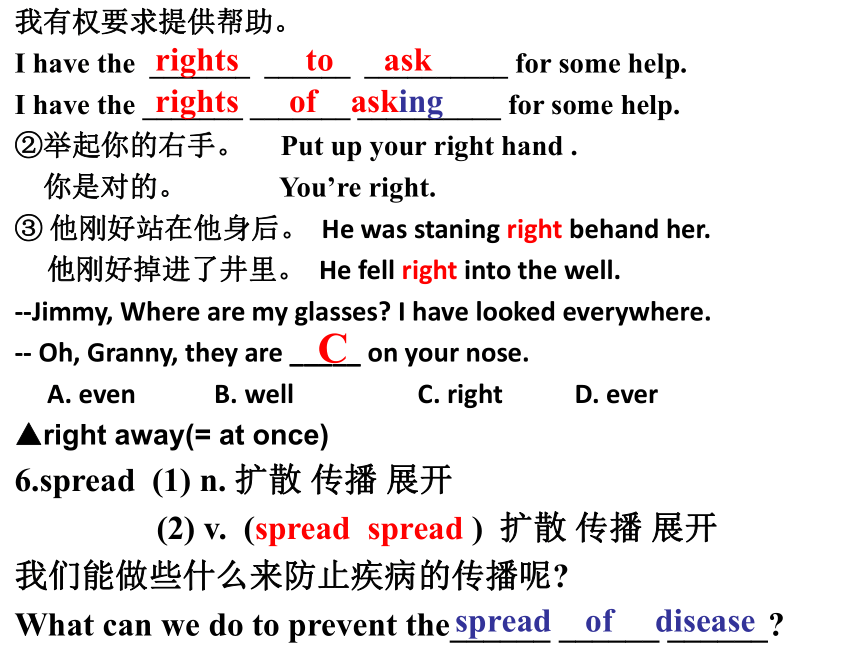
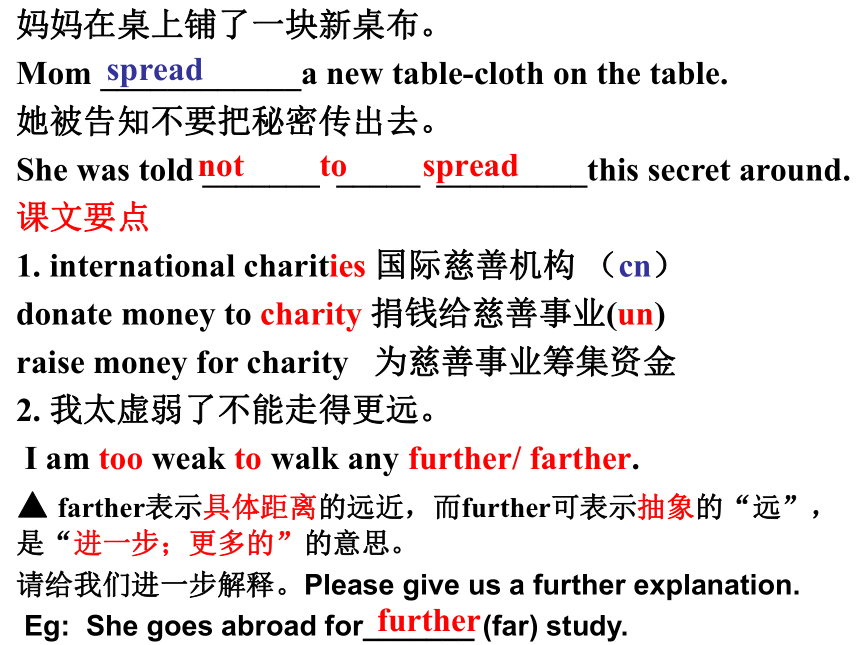
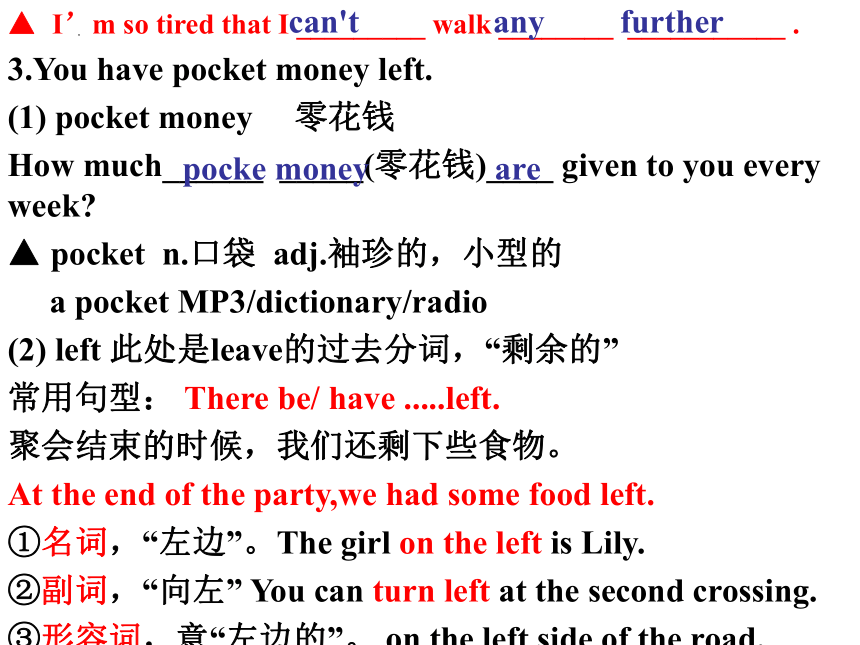
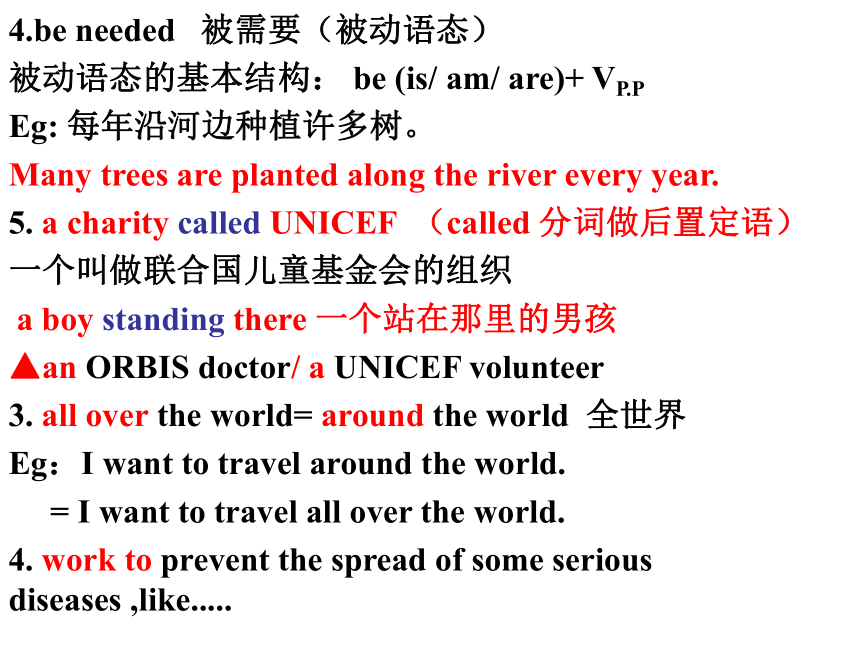
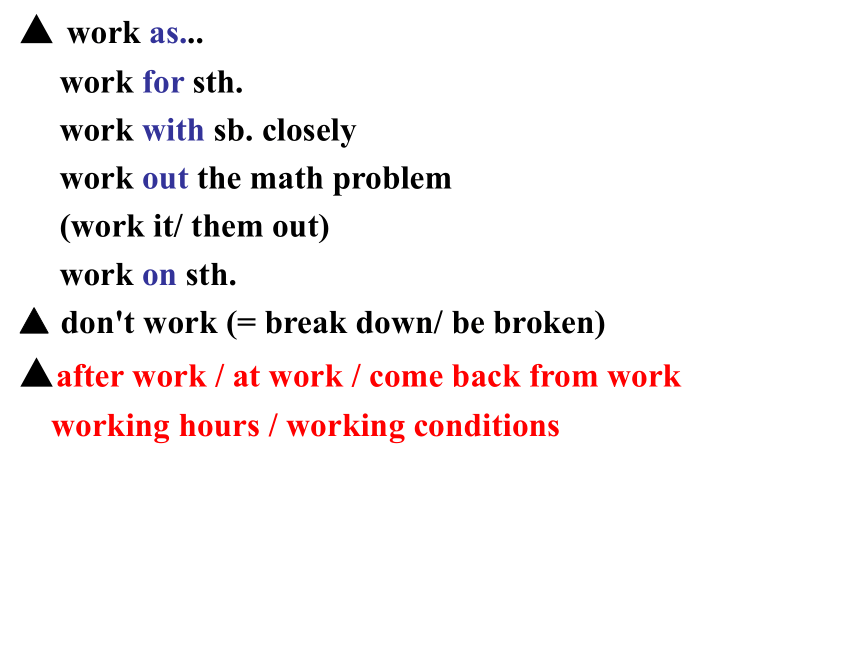
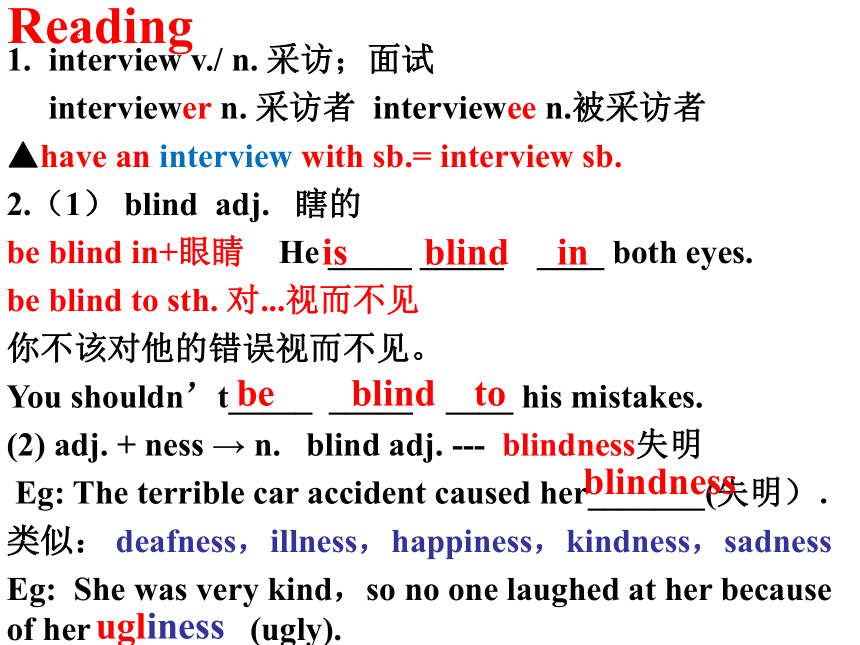
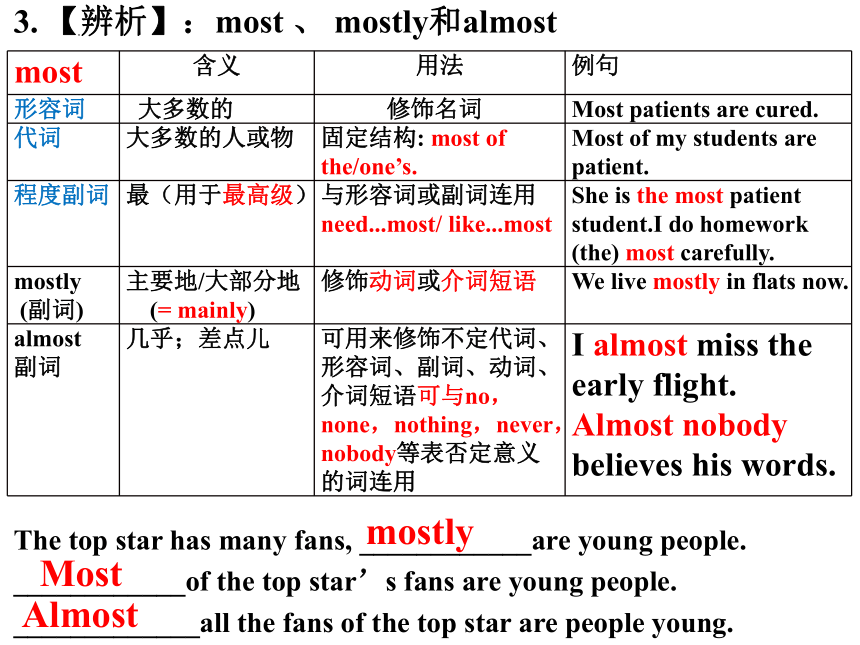
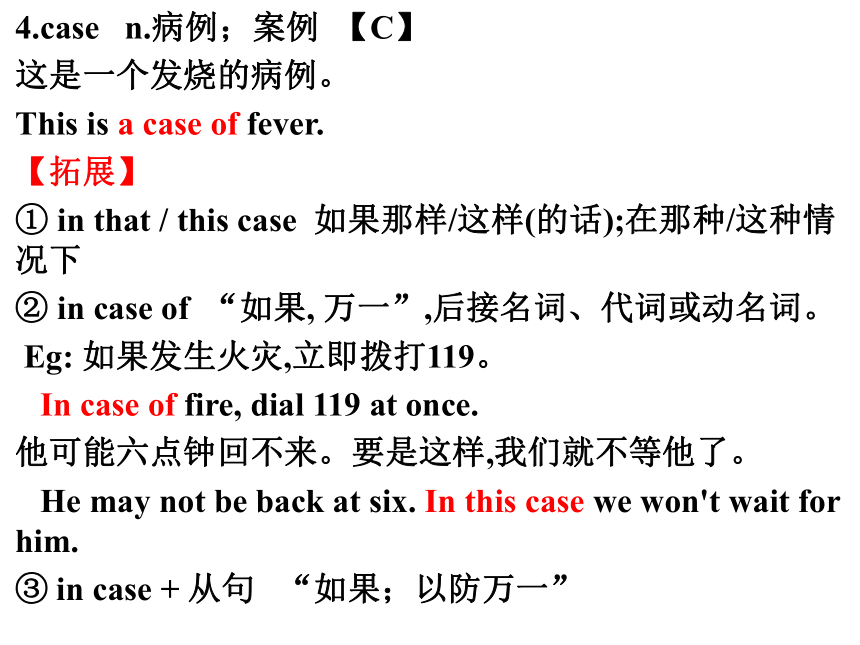
文档简介
(共36张PPT)
welcome to the unit
1. especially 特别;尤其
我喜欢这乡村,尤其是在春天。
I love the country __________ in spring.
噪音令人讨厌尤其当你睡觉的时候。
Noise is unpleasant ______ _____ you are trying to sleep.
▲specially “专门;特地” adv.强调目的的唯一性
special “特别的” adj.
我们是特地来向你学习的。
We came _______ to learn from you.
我们都认为他是个特别的人。
We all think he is a _______ man.
2. basic adj. 基本的
basic education 基础教育 basic skills 基本技能
basic words 基本词汇 basic rights 基本权利
especially
especially when
specially
specical
你必须学会一些基本的生活技能。
You must learn some basic skills for living.
你必须遵守这些基本规则
You must obey/follow these basic rules.
基础教育对于一个国家来说很重要。
Basic education is very important for a country.
每一个人都应该得到基本的权利。
Everyone should get basic rights.
3. education.(n) 不可数名词;表示一段时期的教育可数
receive basic education 接受基础教育
get/ receive an education 接受教育
▲educate (v) educator (n) 教育家
educational (adj)有教育意义的 educated 有教养的
① educate sh to do sth.“教育某人做某”
教育孩子需要耐心。
It takes pa tience to educate children.
你应该教育你儿子对他人友好。
You should educate your son to be friendly to others.
②陶行知是一位伟大的教育家
Tao Xingzhi is a great educator.
③那是一部有教育意义的电影。
That is _______ ________ _________.
他是一个没受过什么教育的人。
He is a man with ___________ __________.
他是一个受过高等教育的人。
He is ______ ______ _________ _________.
an educational film
little education
a well/highly educated man
4. equal(adj.)
①be equal to...等于;等同 ②equal rights 平等权利
③我们在没方面都平等。
We _____ ______ in every way.
Tom 和Jim 一样高。
Tom _____ ______ _____ Jim in height.
▲equal (vt) 与...相等;等于
Three plus six ______ nine. 3加6等于9.
5. right (1) n. 权利 ; 右边 ( 2)adj. 右边的;对的
(3) adv.正好;恰好 ;立刻马上
①the right of doing sth. = the right to do sth.
这个组织为妇女和女童的平等权利而工作。
The organization works for ____ ___ of girls and women.
are equal
is equal to
equals
equal rights
我有权要求提供帮助。
I have the _______ ______ __________ for some help.
I have the _______ _______ __________ for some help.
②举起你的右手。 Put up your right hand .
你是对的。 You’re right.
③ 他刚好站在他身后。 He was staning right behand her.
他刚好掉进了井里。 He fell right into the well.
--Jimmy, Where are my glasses I have looked everywhere.
-- Oh, Granny, they are _____ on your nose.
A. even B. well C. right D. ever
▲right away(= at once)
6.spread (1) n. 扩散 传播 展开
(2) v. (spread spread ) 扩散 传播 展开
我们能做些什么来防止疾病的传播呢
What can we do to prevent the______ ______ ______
rights to ask
rights of asking
C
spread of disease
妈妈在桌上铺了一块新桌布。
Mom ____________a new table-cloth on the table.
她被告知不要把秘密传出去。
She was told _______ _____ _________this secret around.
课文要点
1. international charities 国际慈善机构 (cn)
donate money to charity 捐钱给慈善事业(un)
raise money for charity 为慈善事业筹集资金
2. 我太虚弱了不能走得更远。
I am too weak to walk any further/ farther.
▲ farther表示具体距离的远近,而further可表示抽象的“远”,是“进一步;更多的”的意思。
请给我们进一步解释。Please give us a further explanation.
Eg: She goes abroad for_______ (far) study.
spread
not to spread
further
▲ I’m so tired that I _________ walk ________ ___________ .
3.You have pocket money left.
(1) pocket money 零花钱
How much______ _____(零花钱)____ given to you every week
▲ pocket n.口袋 adj.袖珍的,小型的
a pocket MP3/dictionary/radio
(2) left 此处是leave的过去分词,“剩余的”
常用句型: There be/ have .....left.
聚会结束的时候,我们还剩下些食物。
At the end of the party,we had some food left.
①名词,“左边”。The girl on the left is Lily.
②副词,“向左” You can turn left at the second crossing.
③形容词,意“左边的”。 on the left side of the road.
can't any further
pocke money are
4.be needed 被需要(被动语态)
被动语态的基本结构: be (is/ am/ are)+ VP.P
Eg: 每年沿河边种植许多树。
Many trees are planted along the river every year.
5. a charity called UNICEF (called 分词做后置定语)
一个叫做联合国儿童基金会的组织
a boy standing there 一个站在那里的男孩
▲an ORBIS doctor/ a UNICEF volunteer
3. all over the world= around the world 全世界
Eg:I want to travel around the world.
= I want to travel all over the world.
4. work to prevent the spread of some serious diseases ,like.....
▲ work as...
work for sth.
work with sb. closely
work out the math problem
(work it/ them out)
work on sth.
▲ don't work (= break down/ be broken)
▲after work / at work / come back from work
working hours / working conditions
Reading
1. interview v./ n. 采访;面试
interviewer n. 采访者 interviewee n.被采访者
▲have an interview with sb.= interview sb.
2.(1) blind adj. 瞎的
be blind in+眼睛 He _____ _____ ____ both eyes.
be blind to sth. 对...视而不见
你不该对他的错误视而不见。
You shouldn’t_____ _____ ____ his mistakes.
(2) adj. + ness → n. blind adj. --- blindness失明
Eg: The terrible car accident caused her_______(失明).
类似: deafness,illness,happiness,kindness,sadness
Eg: She was very kind,so no one laughed at her because of her_________ (ugly).
is blind in
be blind to
blindness
ugliness
3. 【辨析】:most 、 mostly和almost
The top star has many fans, ____________are young people.
____________of the top star’s fans are young people.
_____________all the fans of the top star are people young.
most 含义 用法 例句
形容词 大多数的 修饰名词 Most patients are cured.
代词 大多数的人或物 固定结构: most of the/one’s. Most of my students are patient.
程度副词 最(用于最高级) 与形容词或副词连用 need...most/ like...most She is the most patient student.I do homework (the) most carefully.
mostly (副词) 主要地/大部分地 (= mainly) 修饰动词或介词短语 We live mostly in flats now.
almost 副词 几乎;差点儿 可用来修饰不定代词、形容词、副词、动词、介词短语可与no,none,nothing,never,nobody等表否定意义的词连用 I almost miss the early flight.
Almost nobody believes his words.
mostly
Most
Almost
4.case n.病例;案例 【C】
这是一个发烧的病例。
This is a case of fever.
【拓展】
① in that / this case 如果那样/这样(的话);在那种/这种情况下
② in case of “如果, 万一”,后接名词、代词或动名词。
Eg: 如果发生火灾,立即拨打119。
In case of fire, dial 119 at once.
他可能六点钟回不来。要是这样,我们就不等他了。
He may not be back at six. In this case we won't wait for him.
③ in case + 从句 “如果;以防万一”
5. cure v. 治愈 treat 强调治疗(n. treatment)
cure 强调治愈/cure cure sb of + some disease
①这位医生已治愈了数千名病人
The doctor_______ __________thousands of people.
他治好了我的头疼病。
He __________ ________ _________ my headache.
②医学治疗__________ ________
类似词性转换:v. + ment →n. improve----_________
manage ----________ agree----________ achieve--______
treat v./n. (1) 对待 他应当被当做朋友对待。treat sb. as...
He must ________ ________ as a friend.
(2) 治疗 他的眼病必须得到治疗。
His eye problem must __________ __________.
has cured
cured me of
medical treatment
improvement
management
agreement
achievement
be treated
be treated
▲ treat n.招待;请客
give sb. a treat of sth. 给某人...招待
= treat sb with sth.
6.medicine [U]. 药;医学;医术 medical adj. 医学的
take the medicine 吃药 医生叫他每天服药3次。
The doctor told him to take the_______ three times a day.
现代医学发展很快。________ _______ develops quickly.
医学方面的发展 ____________development
7. patient n. 病人 adj. 有耐心的 反义词: i___________
▲ be patient with sb. “对某人有耐心”
These patients are waiting for the doctor to come.
As a doctor,you should be patient with all the patients.
作为一名医生,你应该对所有的病人有耐心。
medicine
Modern medicine
medical
mpatient
8. afford vt. 用在 can , could, be able to 之后,表示“负担得起(…的费用,损失,后果等)”
afford sth “负担得起某物”
afford to do sth. 有足够的钱去做……
你能买得起一辆新车吗?
Can you ________ ( ________ ______ ) a new car
他付不起手术费。
He couldn’t ______ _____ _____ ______ the operation.
9. go to hospital = see a doctor
go to the hospital / be in hospital/ be in the hospital
10. on board 在飞机(船、火车)上
▲ board 与broad的拼写.
board意为“木板,板子”,broad意为“宽阔的”,
afford to buy
afford to pay for
Eg: Eagles have broad wings. 老鹰有宽阔的翅膀。
Eg: Have the passengers gone on board yet
乘客们登机了吗?
▲ abroad 副词,意为“在国外”go abroad 去国外
11.operate不及物动词,“开刀;做手术”,
operate on sb. “给某人做手术”
= do an operation/ operations on sb.
have an operation
Eg: The doctor is operating on him.医生正在给他做手术。
▲ operate“操作;开动(机器等)”。
His father is operating the machine. 他爸爸正在操作机器。
12. proud adj.自豪的,骄傲的 (prouder-proudest)
▲ pride(n)骄傲 the pride of ...
(1) be proud to do/ take pride in doing
Miss Cai is proud ________ __________(be) a teacher
(2) be proud of sb. /sth
Miss Cai ______ _________ _____ her students.
(3) be proud (that)+ 宾语从句
Miss Cao is proud (that ) she is a teacher.
我的父母以我为豪。
I’m the pride of my parents.
= My parents are proud of me.
13. develop v. 发展,培养
① developing 发展中的 developed 发达的
▲ a developing/developed country
② development n. 发展 with the development of ...
to be
are proud of
Eg : (1)发展基础教育很重要。
It’s important to _______ _________ __________.
(2) 我们必须尽早培养孩子读书的习惯。
We must _______ children’s ______ ______as early as possible.
(3) 随着现代医学的发展,这病是可以被治愈的。
_______ _______ _______ _____ modern medicine, this disease can be cured.
North Korea is a______ country while Canada is a_____ country.
14. carry on with sth.“继续做某事”,
=carry on doing sth./go on doing sth/ continue doing sth.
Let's carry on with the work. 让我们继续工作吧。
Let's continue with work. /Let's continue working.
develop basic education
develop reading habits
With the development of
develping
developed
课文要点
1. tell sb. (about) sth. 告诉某人(关于)某事
① tell a story/joke讲故事/笑话
② tell sb. (not) to do sth.
③ tell sb. (about) sth.告诉某人某事
2. ORBIS uses its Flying Eye Hospital to visit poor areas. flying adj. “飞的;飞行的;会飞的”
Eg: There is a strange flying object in the sky.
There are some flying insects in the forest.
(1)fly-flew-flown
(2) flight(n.) 航班 take a direct flight to...
3. The plane is also used as a training centre.
be used as...“被用作……”
①be used for(doing) sth“被用来……”
②be used by sb. “被……使用”
③be used in... “被用于……方面”
小刀是用来切割东西的。
A knife is used for cutting things.
汉语被越来越多的外国人使用。
Chinese is used by more and more foreigners.
我希望这些钱被用在医学研究上。
I hope that the money is used in medical research.
4. Is there anything else you'd like to say to our readers
▲ anything常用于否定句或疑问句中,若用于肯定句,则可意为“任何事”
①something不定代词,“某事或某物”,常用于肯定句,
用于表示请求、邀请、建议等语气的疑问句中。
②nothing不定代词,“没有某物,没有事”,常用于否定句中。
5. can be prevented or cured 能够被预防或治疗
be invited 被邀请
can be treated and cured 可以被治疗或治愈
6. By training them, we hope to help more people.
▲ by是介词“通过某种方法、手段”,后接名词或者动词-ing形式。
看看今天的报纸,你就能对这条信息有更多的了解
You can learn more about the news by reading today’s newspaper.
1.leaflet 可数名词,“传单:散页印刷品”
Eg: They are giving/ handing out leaflets.
他们正在分发传单。
2. hand out “分发:发出”(= give out)
反义词: hand in 意为“上交”
注意: hand out与hand in的宾语如果是名词,可放在短语中间或者后面;如果中宾语是人称代词,只能放在短语的中间
Eg: The teacher handed them out to the students.
老师把它们发给了学生。
Please hand it in. 请把它交上。
▲ hand over 移交 give sb. a helping hand 伸出援助之手
by hand 手工 lift one's hand 举手
on the other hand 在另一方面
Grammar
3. hold及物动词“举行” (held-held)
Eg: Our school will hold the sports meeting next week.
我们学校下周将举行运动会。
The 29th Olympic Games were held in Beijing in 2008.
第29届奥林匹克运动会是2008年在北京举行的
▲ hold作及物动词,还有以下含义:
①“容纳”The classroom can hold over100 students. ②“握住;抓住”He was holding his father's hand tightly.
③ hold on 稍等;别挂断 take/get hold of ...
4. set(set,set) “创建,建立”
①set up“建立”; “搭建/建起”
The school was set up in 1999. 这所学校在1999年被建成。
set up的宾语如果是代词,只能将其放在set up的中间;
▲ set off 出发 set out to do 着手做...
set an example to/ for sb. 为某人梳树立榜样
set fire to ....放火...
5. with its help “在某人的帮助下”,
其反义短语为 without one's help
with the help of sb “在某人的帮助下”
with the support of...在某人的支持下
with the development of...随着...的发展
6. 语态是动词的一种形式,表示的是主语和谓语之间的关系。英语中的语态有两种:主动语态和被动语态
当主语是谓语的执行者时,用主动语态。当主语是谓语的承受者时,用被动语态。
1.被动语态的构成: be + V-ed
2.基本用法
①动作的执行者是泛指或不言自明。
e.g. None of the books was taken away. 没有一本书被拿走
②不知道动作的执行者是谁
e.g. The toy is designed for children .
这款玩具是为孩子们设计的
③需要强调动作的承受者
e.g. My bike was repaired. 我的自行车修好了
④出于委婉或礼貌而避谈动作的执行者
e.g. This problem was talked about just now
这个问题刚才被讨论过了
【注意】被动语态要引出动作的执行者时,通常用by
e.g. Mr Wu is liked by all of his students.
所有的学生都喜欢吴老师
3.基本句型 (被动语态时态体现在be动词上 )
被动语态的一般现在时: am/is/are +V-pp
被动语态的一般过去时: was/were +V-ed
被动语态的一般将来时:will be+V-pp
被动语态的现在完成时:have/has been+V-/pp
情态动词的被动语态: 情态动词+be+V-pp
4. 注意事项
(1) 有些动词常用于被动语态,如born
(2)有些动词主动语态形式含有被动意义,无被动语态
如系动词:smell,taste,sound,feel
有些不及物动词与副词well/easily连用,常用主动语态read,write,draw,sell,wash,clean,
(3)die,take place,happen,come true,break down,break out 等动词短语没有被动语态
(4).有些动词(感官动词和使役动词)主动语态中,动词不定式省去to,被动语态要加上 如 make,see,hear
sb. be made/ seen/ heard/ watched to do sth.
sb. be seen/ heard/ watched doing sth.
(5). 可接双宾语的动词如buy,give,show 等有两种被动语态变化形式 (注意to/for的不同搭配)
He gave me some books.
I was given some books by him.
Some books were given to me by him.
They bought us a toy car.
We were bought a toy car by them.
A toy car was bought for us by them.
(6)动词短语中的不及物动词后的介词(或副词)不能省略。
1. war.(n)战争
① be at war 处于交战中
② a trade war 一场贸易战
③ the Second World War/ the World War II 二战
the war between England and Scotland
Eg: 他们交战多久了?
How long have they been at war
2. organize(v)→organization(n)/organizer(n).→
organized(adj.) 有条理的
Eg: Our school often organizes different activities.
This is a new organization.
Integrated skills
3. pale adj. (paler-palest)
①苍白的 look even paler 看起来更苍白
After hearing the bad news, her face turned pale quickly.
②暗淡的 pale lights
4.matter (n/v.)
①用作可数名词“事情;问题;毛病”
某人怎么了?
What’s the matter (with sb.) =What’s wrong (with sb.) =What’s the trouble (with sb.) =What has happened (to sb.)
What’s the matter with you 你怎么了?
② matter不及物动词,“有关系,要紧”,一般用于否定句或疑问句。
It doesn't matter.相当于That's all right.或Never mind.
5. check 可数名词“检查;检验;核对”;
① have a check 检查一下
▲类似have a check 的短语如:
have a look 看一看 have a swim 游泳
have a rest 休息 have a break 休息
have a walk 散步 have a try 试一试
have a discussion 讨论 have a talk 谈一谈
② check 及物动词“检查;检验;核对”
Eg: Check your work before handing it in.
③ check in 登记入住 check out 结账退房
课文要点
1. be part of… …中的一部分
注:表示某某的一部分时前面不用加冠词
Eg: 联合国儿童基金会是联合国的一部分
UNICEF is part of the United Nations.
中国在亚洲的东部。
China is in the eastern part of Asian.
The organization is__ their club and it__three months ago.
A. a part of; set up B. part of; is set up
C. part of; was set up D. parts of; was set up
▲ take part in 参加
2. I don’t feel well. (P102)
▲well是形容词(身体)好的,健康的
C
▲well 还可以是副词,用来修饰行为动词
Eg:How well she is dancing.
▲well还可以用作名词,表示“井”
Eg: a dry well 一口枯井
3. in a few days
①“in+时间段”,表示“一段时间之后,一段时间之内”,当表示一段时间之后时与一般将来时连用。
② in the past few days 在过去的几天里,与现在完成时搭配
③ after +一段时间 一段时间后,常与一般过去时连用。
相当于“一段时间+ later”
▲ “in+一段时间”提问,应该用how soon,意思是“多久以后”。-How soon will he come back -In ten days.
Eg: They left the village after three days.
= They left the village 3 days later.
Study skills
1.not …at all 一点也不
e.g. He can't dance at all.
--Thank you.--Not at all.
2.not… any more.=no more
not…any longer=no longer 不再
e.g.I won't believe you any more.
=I will no more believe you.
I am not a student any longer.
=I am no longer a student.
Task
1.secretary n.秘书 复数:secretaries
2.afraid adj. be afraid to do sth 害怕做某事
be afraid of sth/doing sth/that 从句
I'm afraid so./not.
3.train v.训练 train as+职业 train to be训练成为…
train for sth train sb/sth to do sth
n.training 训练 不可数n receive training
4.work for sth/work to do sth 致力于……
work as+职业 work as a volunteer
5.once adv.曾经,一度,一次
once a day How often./How many times ……a day
at once/right away立即,马上
once more/again 再次 once upon a time从前
6.comfortable adj.舒服的 反:uncomfortable
live a comfortable life=live comfortably
7.drive to work/school=go to school/work by car
drove-driven
8.make up one's mind to do sth.决定做某事
=decide to do sth=make a decision to do sth
mind. n.头脑,精神,决心,想法
change one's mind 改变主意
keep sth in mind 牢记某事
v.介意 Would you mind (one's/sb(宾) ) doing sth
同意: Of course not./Certainly not./No, not at all.
不同意: Of course./Certainly.
Never Mind.没关系。
9.attend v.出席,参加
attend the meeting/our discussion/courses
10.be used to do 被用来做某事
be/get used to doing sth 过去常常做某事
e.g. There used to be a river here.
11.sb be glad /happy to do sth
12.It's meaningful/meaningless for sb to do sth.
mean v.→meant→meant
13.India n.印度 in India n.Indian 印度人 an Indian
adj.Indian 印度的,印度人的 Indian tourists
14.officer n.官员 an officer a UNICEF officer
office n.办公室 an office lady a police office
offical adj.官方的 English is an offical language.
15.enter sp.=come/go into sp.
welcome to the unit
1. especially 特别;尤其
我喜欢这乡村,尤其是在春天。
I love the country __________ in spring.
噪音令人讨厌尤其当你睡觉的时候。
Noise is unpleasant ______ _____ you are trying to sleep.
▲specially “专门;特地” adv.强调目的的唯一性
special “特别的” adj.
我们是特地来向你学习的。
We came _______ to learn from you.
我们都认为他是个特别的人。
We all think he is a _______ man.
2. basic adj. 基本的
basic education 基础教育 basic skills 基本技能
basic words 基本词汇 basic rights 基本权利
especially
especially when
specially
specical
你必须学会一些基本的生活技能。
You must learn some basic skills for living.
你必须遵守这些基本规则
You must obey/follow these basic rules.
基础教育对于一个国家来说很重要。
Basic education is very important for a country.
每一个人都应该得到基本的权利。
Everyone should get basic rights.
3. education.(n) 不可数名词;表示一段时期的教育可数
receive basic education 接受基础教育
get/ receive an education 接受教育
▲educate (v) educator (n) 教育家
educational (adj)有教育意义的 educated 有教养的
① educate sh to do sth.“教育某人做某”
教育孩子需要耐心。
It takes pa tience to educate children.
你应该教育你儿子对他人友好。
You should educate your son to be friendly to others.
②陶行知是一位伟大的教育家
Tao Xingzhi is a great educator.
③那是一部有教育意义的电影。
That is _______ ________ _________.
他是一个没受过什么教育的人。
He is a man with ___________ __________.
他是一个受过高等教育的人。
He is ______ ______ _________ _________.
an educational film
little education
a well/highly educated man
4. equal(adj.)
①be equal to...等于;等同 ②equal rights 平等权利
③我们在没方面都平等。
We _____ ______ in every way.
Tom 和Jim 一样高。
Tom _____ ______ _____ Jim in height.
▲equal (vt) 与...相等;等于
Three plus six ______ nine. 3加6等于9.
5. right (1) n. 权利 ; 右边 ( 2)adj. 右边的;对的
(3) adv.正好;恰好 ;立刻马上
①the right of doing sth. = the right to do sth.
这个组织为妇女和女童的平等权利而工作。
The organization works for ____ ___ of girls and women.
are equal
is equal to
equals
equal rights
我有权要求提供帮助。
I have the _______ ______ __________ for some help.
I have the _______ _______ __________ for some help.
②举起你的右手。 Put up your right hand .
你是对的。 You’re right.
③ 他刚好站在他身后。 He was staning right behand her.
他刚好掉进了井里。 He fell right into the well.
--Jimmy, Where are my glasses I have looked everywhere.
-- Oh, Granny, they are _____ on your nose.
A. even B. well C. right D. ever
▲right away(= at once)
6.spread (1) n. 扩散 传播 展开
(2) v. (spread spread ) 扩散 传播 展开
我们能做些什么来防止疾病的传播呢
What can we do to prevent the______ ______ ______
rights to ask
rights of asking
C
spread of disease
妈妈在桌上铺了一块新桌布。
Mom ____________a new table-cloth on the table.
她被告知不要把秘密传出去。
She was told _______ _____ _________this secret around.
课文要点
1. international charities 国际慈善机构 (cn)
donate money to charity 捐钱给慈善事业(un)
raise money for charity 为慈善事业筹集资金
2. 我太虚弱了不能走得更远。
I am too weak to walk any further/ farther.
▲ farther表示具体距离的远近,而further可表示抽象的“远”,是“进一步;更多的”的意思。
请给我们进一步解释。Please give us a further explanation.
Eg: She goes abroad for_______ (far) study.
spread
not to spread
further
▲ I’m so tired that I _________ walk ________ ___________ .
3.You have pocket money left.
(1) pocket money 零花钱
How much______ _____(零花钱)____ given to you every week
▲ pocket n.口袋 adj.袖珍的,小型的
a pocket MP3/dictionary/radio
(2) left 此处是leave的过去分词,“剩余的”
常用句型: There be/ have .....left.
聚会结束的时候,我们还剩下些食物。
At the end of the party,we had some food left.
①名词,“左边”。The girl on the left is Lily.
②副词,“向左” You can turn left at the second crossing.
③形容词,意“左边的”。 on the left side of the road.
can't any further
pocke money are
4.be needed 被需要(被动语态)
被动语态的基本结构: be (is/ am/ are)+ VP.P
Eg: 每年沿河边种植许多树。
Many trees are planted along the river every year.
5. a charity called UNICEF (called 分词做后置定语)
一个叫做联合国儿童基金会的组织
a boy standing there 一个站在那里的男孩
▲an ORBIS doctor/ a UNICEF volunteer
3. all over the world= around the world 全世界
Eg:I want to travel around the world.
= I want to travel all over the world.
4. work to prevent the spread of some serious diseases ,like.....
▲ work as...
work for sth.
work with sb. closely
work out the math problem
(work it/ them out)
work on sth.
▲ don't work (= break down/ be broken)
▲after work / at work / come back from work
working hours / working conditions
Reading
1. interview v./ n. 采访;面试
interviewer n. 采访者 interviewee n.被采访者
▲have an interview with sb.= interview sb.
2.(1) blind adj. 瞎的
be blind in+眼睛 He _____ _____ ____ both eyes.
be blind to sth. 对...视而不见
你不该对他的错误视而不见。
You shouldn’t_____ _____ ____ his mistakes.
(2) adj. + ness → n. blind adj. --- blindness失明
Eg: The terrible car accident caused her_______(失明).
类似: deafness,illness,happiness,kindness,sadness
Eg: She was very kind,so no one laughed at her because of her_________ (ugly).
is blind in
be blind to
blindness
ugliness
3. 【辨析】:most 、 mostly和almost
The top star has many fans, ____________are young people.
____________of the top star’s fans are young people.
_____________all the fans of the top star are people young.
most 含义 用法 例句
形容词 大多数的 修饰名词 Most patients are cured.
代词 大多数的人或物 固定结构: most of the/one’s. Most of my students are patient.
程度副词 最(用于最高级) 与形容词或副词连用 need...most/ like...most She is the most patient student.I do homework (the) most carefully.
mostly (副词) 主要地/大部分地 (= mainly) 修饰动词或介词短语 We live mostly in flats now.
almost 副词 几乎;差点儿 可用来修饰不定代词、形容词、副词、动词、介词短语可与no,none,nothing,never,nobody等表否定意义的词连用 I almost miss the early flight.
Almost nobody believes his words.
mostly
Most
Almost
4.case n.病例;案例 【C】
这是一个发烧的病例。
This is a case of fever.
【拓展】
① in that / this case 如果那样/这样(的话);在那种/这种情况下
② in case of “如果, 万一”,后接名词、代词或动名词。
Eg: 如果发生火灾,立即拨打119。
In case of fire, dial 119 at once.
他可能六点钟回不来。要是这样,我们就不等他了。
He may not be back at six. In this case we won't wait for him.
③ in case + 从句 “如果;以防万一”
5. cure v. 治愈 treat 强调治疗(n. treatment)
cure 强调治愈/cure cure sb of + some disease
①这位医生已治愈了数千名病人
The doctor_______ __________thousands of people.
他治好了我的头疼病。
He __________ ________ _________ my headache.
②医学治疗__________ ________
类似词性转换:v. + ment →n. improve----_________
manage ----________ agree----________ achieve--______
treat v./n. (1) 对待 他应当被当做朋友对待。treat sb. as...
He must ________ ________ as a friend.
(2) 治疗 他的眼病必须得到治疗。
His eye problem must __________ __________.
has cured
cured me of
medical treatment
improvement
management
agreement
achievement
be treated
be treated
▲ treat n.招待;请客
give sb. a treat of sth. 给某人...招待
= treat sb with sth.
6.medicine [U]. 药;医学;医术 medical adj. 医学的
take the medicine 吃药 医生叫他每天服药3次。
The doctor told him to take the_______ three times a day.
现代医学发展很快。________ _______ develops quickly.
医学方面的发展 ____________development
7. patient n. 病人 adj. 有耐心的 反义词: i___________
▲ be patient with sb. “对某人有耐心”
These patients are waiting for the doctor to come.
As a doctor,you should be patient with all the patients.
作为一名医生,你应该对所有的病人有耐心。
medicine
Modern medicine
medical
mpatient
8. afford vt. 用在 can , could, be able to 之后,表示“负担得起(…的费用,损失,后果等)”
afford sth “负担得起某物”
afford to do sth. 有足够的钱去做……
你能买得起一辆新车吗?
Can you ________ ( ________ ______ ) a new car
他付不起手术费。
He couldn’t ______ _____ _____ ______ the operation.
9. go to hospital = see a doctor
go to the hospital / be in hospital/ be in the hospital
10. on board 在飞机(船、火车)上
▲ board 与broad的拼写.
board意为“木板,板子”,broad意为“宽阔的”,
afford to buy
afford to pay for
Eg: Eagles have broad wings. 老鹰有宽阔的翅膀。
Eg: Have the passengers gone on board yet
乘客们登机了吗?
▲ abroad 副词,意为“在国外”go abroad 去国外
11.operate不及物动词,“开刀;做手术”,
operate on sb. “给某人做手术”
= do an operation/ operations on sb.
have an operation
Eg: The doctor is operating on him.医生正在给他做手术。
▲ operate“操作;开动(机器等)”。
His father is operating the machine. 他爸爸正在操作机器。
12. proud adj.自豪的,骄傲的 (prouder-proudest)
▲ pride(n)骄傲 the pride of ...
(1) be proud to do/ take pride in doing
Miss Cai is proud ________ __________(be) a teacher
(2) be proud of sb. /sth
Miss Cai ______ _________ _____ her students.
(3) be proud (that)+ 宾语从句
Miss Cao is proud (that ) she is a teacher.
我的父母以我为豪。
I’m the pride of my parents.
= My parents are proud of me.
13. develop v. 发展,培养
① developing 发展中的 developed 发达的
▲ a developing/developed country
② development n. 发展 with the development of ...
to be
are proud of
Eg : (1)发展基础教育很重要。
It’s important to _______ _________ __________.
(2) 我们必须尽早培养孩子读书的习惯。
We must _______ children’s ______ ______as early as possible.
(3) 随着现代医学的发展,这病是可以被治愈的。
_______ _______ _______ _____ modern medicine, this disease can be cured.
North Korea is a______ country while Canada is a_____ country.
14. carry on with sth.“继续做某事”,
=carry on doing sth./go on doing sth/ continue doing sth.
Let's carry on with the work. 让我们继续工作吧。
Let's continue with work. /Let's continue working.
develop basic education
develop reading habits
With the development of
develping
developed
课文要点
1. tell sb. (about) sth. 告诉某人(关于)某事
① tell a story/joke讲故事/笑话
② tell sb. (not) to do sth.
③ tell sb. (about) sth.告诉某人某事
2. ORBIS uses its Flying Eye Hospital to visit poor areas. flying adj. “飞的;飞行的;会飞的”
Eg: There is a strange flying object in the sky.
There are some flying insects in the forest.
(1)fly-flew-flown
(2) flight(n.) 航班 take a direct flight to...
3. The plane is also used as a training centre.
be used as...“被用作……”
①be used for(doing) sth“被用来……”
②be used by sb. “被……使用”
③be used in... “被用于……方面”
小刀是用来切割东西的。
A knife is used for cutting things.
汉语被越来越多的外国人使用。
Chinese is used by more and more foreigners.
我希望这些钱被用在医学研究上。
I hope that the money is used in medical research.
4. Is there anything else you'd like to say to our readers
▲ anything常用于否定句或疑问句中,若用于肯定句,则可意为“任何事”
①something不定代词,“某事或某物”,常用于肯定句,
用于表示请求、邀请、建议等语气的疑问句中。
②nothing不定代词,“没有某物,没有事”,常用于否定句中。
5. can be prevented or cured 能够被预防或治疗
be invited 被邀请
can be treated and cured 可以被治疗或治愈
6. By training them, we hope to help more people.
▲ by是介词“通过某种方法、手段”,后接名词或者动词-ing形式。
看看今天的报纸,你就能对这条信息有更多的了解
You can learn more about the news by reading today’s newspaper.
1.leaflet 可数名词,“传单:散页印刷品”
Eg: They are giving/ handing out leaflets.
他们正在分发传单。
2. hand out “分发:发出”(= give out)
反义词: hand in 意为“上交”
注意: hand out与hand in的宾语如果是名词,可放在短语中间或者后面;如果中宾语是人称代词,只能放在短语的中间
Eg: The teacher handed them out to the students.
老师把它们发给了学生。
Please hand it in. 请把它交上。
▲ hand over 移交 give sb. a helping hand 伸出援助之手
by hand 手工 lift one's hand 举手
on the other hand 在另一方面
Grammar
3. hold及物动词“举行” (held-held)
Eg: Our school will hold the sports meeting next week.
我们学校下周将举行运动会。
The 29th Olympic Games were held in Beijing in 2008.
第29届奥林匹克运动会是2008年在北京举行的
▲ hold作及物动词,还有以下含义:
①“容纳”The classroom can hold over100 students. ②“握住;抓住”He was holding his father's hand tightly.
③ hold on 稍等;别挂断 take/get hold of ...
4. set(set,set) “创建,建立”
①set up“建立”; “搭建/建起”
The school was set up in 1999. 这所学校在1999年被建成。
set up的宾语如果是代词,只能将其放在set up的中间;
▲ set off 出发 set out to do 着手做...
set an example to/ for sb. 为某人梳树立榜样
set fire to ....放火...
5. with its help “在某人的帮助下”,
其反义短语为 without one's help
with the help of sb “在某人的帮助下”
with the support of...在某人的支持下
with the development of...随着...的发展
6. 语态是动词的一种形式,表示的是主语和谓语之间的关系。英语中的语态有两种:主动语态和被动语态
当主语是谓语的执行者时,用主动语态。当主语是谓语的承受者时,用被动语态。
1.被动语态的构成: be + V-ed
2.基本用法
①动作的执行者是泛指或不言自明。
e.g. None of the books was taken away. 没有一本书被拿走
②不知道动作的执行者是谁
e.g. The toy is designed for children .
这款玩具是为孩子们设计的
③需要强调动作的承受者
e.g. My bike was repaired. 我的自行车修好了
④出于委婉或礼貌而避谈动作的执行者
e.g. This problem was talked about just now
这个问题刚才被讨论过了
【注意】被动语态要引出动作的执行者时,通常用by
e.g. Mr Wu is liked by all of his students.
所有的学生都喜欢吴老师
3.基本句型 (被动语态时态体现在be动词上 )
被动语态的一般现在时: am/is/are +V-pp
被动语态的一般过去时: was/were +V-ed
被动语态的一般将来时:will be+V-pp
被动语态的现在完成时:have/has been+V-/pp
情态动词的被动语态: 情态动词+be+V-pp
4. 注意事项
(1) 有些动词常用于被动语态,如born
(2)有些动词主动语态形式含有被动意义,无被动语态
如系动词:smell,taste,sound,feel
有些不及物动词与副词well/easily连用,常用主动语态read,write,draw,sell,wash,clean,
(3)die,take place,happen,come true,break down,break out 等动词短语没有被动语态
(4).有些动词(感官动词和使役动词)主动语态中,动词不定式省去to,被动语态要加上 如 make,see,hear
sb. be made/ seen/ heard/ watched to do sth.
sb. be seen/ heard/ watched doing sth.
(5). 可接双宾语的动词如buy,give,show 等有两种被动语态变化形式 (注意to/for的不同搭配)
He gave me some books.
I was given some books by him.
Some books were given to me by him.
They bought us a toy car.
We were bought a toy car by them.
A toy car was bought for us by them.
(6)动词短语中的不及物动词后的介词(或副词)不能省略。
1. war.(n)战争
① be at war 处于交战中
② a trade war 一场贸易战
③ the Second World War/ the World War II 二战
the war between England and Scotland
Eg: 他们交战多久了?
How long have they been at war
2. organize(v)→organization(n)/organizer(n).→
organized(adj.) 有条理的
Eg: Our school often organizes different activities.
This is a new organization.
Integrated skills
3. pale adj. (paler-palest)
①苍白的 look even paler 看起来更苍白
After hearing the bad news, her face turned pale quickly.
②暗淡的 pale lights
4.matter (n/v.)
①用作可数名词“事情;问题;毛病”
某人怎么了?
What’s the matter (with sb.) =What’s wrong (with sb.) =What’s the trouble (with sb.) =What has happened (to sb.)
What’s the matter with you 你怎么了?
② matter不及物动词,“有关系,要紧”,一般用于否定句或疑问句。
It doesn't matter.相当于That's all right.或Never mind.
5. check 可数名词“检查;检验;核对”;
① have a check 检查一下
▲类似have a check 的短语如:
have a look 看一看 have a swim 游泳
have a rest 休息 have a break 休息
have a walk 散步 have a try 试一试
have a discussion 讨论 have a talk 谈一谈
② check 及物动词“检查;检验;核对”
Eg: Check your work before handing it in.
③ check in 登记入住 check out 结账退房
课文要点
1. be part of… …中的一部分
注:表示某某的一部分时前面不用加冠词
Eg: 联合国儿童基金会是联合国的一部分
UNICEF is part of the United Nations.
中国在亚洲的东部。
China is in the eastern part of Asian.
The organization is__ their club and it__three months ago.
A. a part of; set up B. part of; is set up
C. part of; was set up D. parts of; was set up
▲ take part in 参加
2. I don’t feel well. (P102)
▲well是形容词(身体)好的,健康的
C
▲well 还可以是副词,用来修饰行为动词
Eg:How well she is dancing.
▲well还可以用作名词,表示“井”
Eg: a dry well 一口枯井
3. in a few days
①“in+时间段”,表示“一段时间之后,一段时间之内”,当表示一段时间之后时与一般将来时连用。
② in the past few days 在过去的几天里,与现在完成时搭配
③ after +一段时间 一段时间后,常与一般过去时连用。
相当于“一段时间+ later”
▲ “in+一段时间”提问,应该用how soon,意思是“多久以后”。-How soon will he come back -In ten days.
Eg: They left the village after three days.
= They left the village 3 days later.
Study skills
1.not …at all 一点也不
e.g. He can't dance at all.
--Thank you.--Not at all.
2.not… any more.=no more
not…any longer=no longer 不再
e.g.I won't believe you any more.
=I will no more believe you.
I am not a student any longer.
=I am no longer a student.
Task
1.secretary n.秘书 复数:secretaries
2.afraid adj. be afraid to do sth 害怕做某事
be afraid of sth/doing sth/that 从句
I'm afraid so./not.
3.train v.训练 train as+职业 train to be训练成为…
train for sth train sb/sth to do sth
n.training 训练 不可数n receive training
4.work for sth/work to do sth 致力于……
work as+职业 work as a volunteer
5.once adv.曾经,一度,一次
once a day How often./How many times ……a day
at once/right away立即,马上
once more/again 再次 once upon a time从前
6.comfortable adj.舒服的 反:uncomfortable
live a comfortable life=live comfortably
7.drive to work/school=go to school/work by car
drove-driven
8.make up one's mind to do sth.决定做某事
=decide to do sth=make a decision to do sth
mind. n.头脑,精神,决心,想法
change one's mind 改变主意
keep sth in mind 牢记某事
v.介意 Would you mind (one's/sb(宾) ) doing sth
同意: Of course not./Certainly not./No, not at all.
不同意: Of course./Certainly.
Never Mind.没关系。
9.attend v.出席,参加
attend the meeting/our discussion/courses
10.be used to do 被用来做某事
be/get used to doing sth 过去常常做某事
e.g. There used to be a river here.
11.sb be glad /happy to do sth
12.It's meaningful/meaningless for sb to do sth.
mean v.→meant→meant
13.India n.印度 in India n.Indian 印度人 an Indian
adj.Indian 印度的,印度人的 Indian tourists
14.officer n.官员 an officer a UNICEF officer
office n.办公室 an office lady a police office
offical adj.官方的 English is an offical language.
15.enter sp.=come/go into sp.
